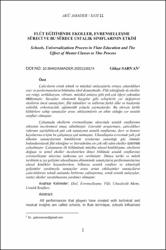Flüt eğitiminde ekoller, evrenselleşme süreci ve bu sürece ustalık sınıflarının etkisi
Citation
Sarvan, G . (2020). FLÜT EĞİTİMİNDE EKOLLER, EVRENSELLEŞME SÜRECİ VE BU SÜRECE USTALIK SINIFLARININ ETKİSİ . Afyon Kocatepe Üniversitesi Akademik Müzik Araştırmaları Dergisi , 6 (11) , 1-22 . Retrieved from https://dergipark.org.tr/tr/pub/amader/issue/52410/619064Abstract
Çalıcıların ortak teknik ve müzikal anlayışlarla ortaya çıkardıkları eser ve performansların bütününe ekol denmektedir. Flüt tekniğinde de ekoller ses rengi, artikülasyon, vibrato, müzikal anlayış gibi pek çok öğeyi yakından etkilemiştir. Savaşlar, ekonomik kaygılar gibi sebeplerle yer değiştiren ekollerin öncü sanatçıları, flüt teknikleri ve stillerini farklı ülke ve kıtalarda solistlik, orkestracılık, eğitmenlik yoluyla yaymışlardır. Bu süreçte farklı kültürlere sahip sanatçılar arası etkileşimlerin en etkin olduğu yer ustalık sınıfları olmuştur.
Çalışmada ekollerin evrenselleşme sürecinde ustalık sınıflarının etkisinin incelenmesi amaç edinilmiştir. Literatür araştırması, çalıcılıkları referans sayılabilecek pek çok sanatçının ustalık sınıflarına, ders ve konser kayıtlarına erişim bu çalışmaya ışık tutmuştur. Ulusallaşma evresinde pek çok ülkenin sanatçılarının kimliklerini icralarına yansıttığı göz önünde bulundurularak flüt tekniğine ve literatürüne en çok etki eden ekoller üzerinde çalışılmıştır. Çalışmanın ilk bölümünde müzikte ulusal kimlikleşme, ekollerin doğuşu ve temel ekoller incelenirken ikinci bölümde ustalık sınıflarının evrenselleşme sürecine katkısına yer verilmiştir. Dünya tarihi ve müzik tarihinin iç içe gelişimi ulusallaşma döneminde sanatçıların performanslarına ulusal kimlikler kazandırırken; bilhassa ustalık sınıfları ve teknolojik gelişimler yardımıyla sanatçılar arası artan etkileşimler sanatçıların çalıcılıklarını teknik anlamda birbirine yaklaştırmış, ortak estetik anlayışlar, sentez ekoller yaratılmasına yardımcı olmuştur. All performances that players have created with technical and musical insights are called schools. In flute technique, schools influenced many elements, such as, sound color, articulation, vibrato and musical understanding. The leading artists of schools, which were relocated by reasons like wars and economic concerns, spread flute techniques& styles through to be presented as soloist, orchestra and instructor in different countries. Through this period, mastery classes were the place where interactions between artists were most effective. Aim of the study is, examine the effect of master classes to the schools through the globalisation process. This literature study is enlighted by access to the mastery classes, lecture and concert records, whose performances could be considered as reference. Schools, which have the most influence on flute technique and literature are studied, considering the fact that artists of many countries reflect their identities in their performances, in the period of nationalization. In the first part of the study, national identity in music, birth of schools and basic schools are researched, in the second part, contribution of master classes to the process of globalization has taken place. The intertwined development of World and Music history brings national identities to performances of artists, during period of nationalization; Especially with help of master classes and technological developments, the increased interactions between artists, have brought the artists' performances closer, in a technical sense and helped to create common aesthetic insights and synthesised schools.
Source
Akademik Müzik Araştırmaları Dergisi “AMADER”Volume
6Issue
11Collections
- Cilt 6 : Sayı 11 [10]



















